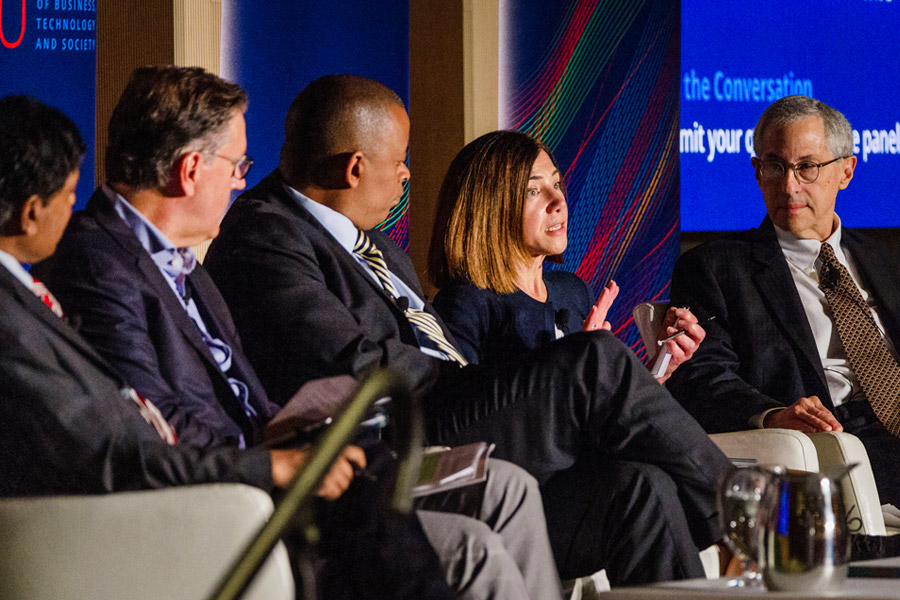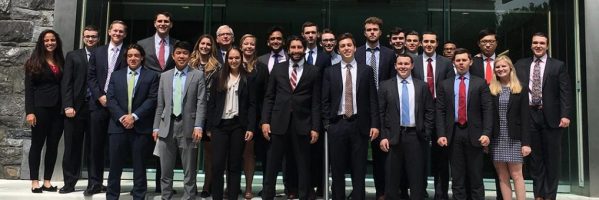News Roundup: New Boston University Online MBA, and More

Let’s take a look at some of the biggest stories from this week, including the new Boston University Online MBA at the Questrom School of Business.
Questrom to Offer Online MBA With edX in 2020 – BU Today
Boston University’s Questrom School of Business will partner with online education platform edX to establish an Online MBA, set to begin in 2020.
On news of the announcement, Boston University President Robert A. Brown says, “With the online MBA, we’re seizing the initiative to offer a major degree for which we believe there is global demand. Higher education must evolve in a fast-changing world. We aim to lead in this evolution.”
Applications officially open on August 16, 2019 and tuition will be $24,000 per year. edX was designed from researchers at Harvard University and MIT in 2012. Since its launch, it has gained more than 21 million users from every country across the world. Chrysanthos Dellarocas, Associate Provost for Digital Learning & Innovation, says, “Through this degree, BU opens itself to the world in a manner we haven’t done before.”
edX started offering Master’s programs last fall, including a master’s in analytics from the Georgia Institute of Technology and a master’s in computer science fro the University of Texas at Austin.
You can read here for more on the online MBA and on edX.
Should Investing be Left to Machines? – UC Davis Graduate School of Management News
Professor and economist Brad Barber of UC Davis Graduate School of Management recently weighed in on the question of the effect of human error in investments. Comprehending biases, he suggests, is the key to improving decisions.
Behavioral biases cost investors 4 percent per year, according to Barber. In a recent article in financial news publication Raconteur, Barber’s research was cited as was that of his colleagues. On the topic of bias and error in investing,
Barber’s colleague Craig Burgess says:
“We are pattern-seeking primates, which is useful for hunting prey, but terrible for complex tasks such as investing. So, we are now regularly prone to hundreds of biases, too deeply ingrained to overcome without removing the human from the process.”
‘Passive investments,’ or those completed via carefully designed software processes, are cheaper than investments performed by a fund manager, and absent of the inherent biases of humans. Many managers, however, argue that skilled ‘active investors’ can beat the effect of bias and error to greater effect than machine learning. For more on Barber’s research, read his profile. For the full Raconteur article, read here.
Save the Date for INTERSECT@CMU: Health Care Innovation – Tepper School of Business Events & Conferences
This year’s INTERSECT@CMU Health Care Innovation Conference will take place on September 13, 2019 at the Tepper School of Business. Registration opens in August.
Among the topics covered by this year’s speakers and panelists will be delivery methods, policy, and emerging technology. Last year’s INTERSECT conference was part of a two-day celebration to commemorate the opening of Tepper Quad. It was also the conference’s inaugural year.

From INTERSECT@CMU 2018 / Photo via cmu.edu/tepper
Opening remarks last year were offered by CMU President Farnam Jahanian and Tepper School Dean Bob Dammon. Jerome Presenti, VP of AI at Facebook, Inc. delivered a keynote speech. Panels covered the growth of smart machines in everyday life, along with the potential of blockchain to revolutionize economies.
To stay posted on this year’s speakers and panelists, visit the INTERSECT@CMU 2019 site.
Million-Dollar Gift for Veterans – USC Marshall News
The USC Marshall School of Business recently announced a $1 million gift from Andrew Tavakoli, MSBA ’86, which will lend support to the Master of Business for Veterans (MBV) program.
The gift will establish the Andrew Tavakoli Family Endowment for MBV Students, which will enable veterans who show exemplary leadership skills and academic performance to advance at USC Marshall. The MBV is a one year graduate program for veterans, active duty, and reserve personnel. It was created to allow vets and those currently serving to apply their military leadership and strategic skills in business settings.
“My hope is that no qualified veteran or active duty personnel would ever be prevented from joining the USC MBV program for lack of financial resources,” Tavakoli says of the gift. He is a member of Marshall’s Board of Leaders and the Los Angeles World Affairs Council. Along with a MSBA from Marshall, Tavakoli holds a BSEE degree in computer science from the University of Pittsburgh and an MBA from California State University Long Beach.
MBV Program Director James Bogle says:
“I truly appreciate Mr. Tavakoli’s support for our veteran students in the MBV program. In our conversations, it quickly became clear that Andrew recognizes the unique potential that former military leaders bring to the business community. “
Read here for more on the MBV and on Andrew Tavakoli.
5 Tips for Making a Meaningful Connection with Employers – Fox School of Business News
Janis Moore Campbell, Director of Graduate Professional Development for the Temple University Fox School of Business‘ Center for Student Professional Development (CSPD) recently offered some helpful hints on how to rise to the top of the applicant pool during your job search.
According to Campbell, the “experience of you that you promise” to an employer is just as vital as your GMAT scores or strong academic record when designing your resume. Most employers want to know what it’s like to work with you, just as much as how well you will perform on any given project.

Work compatability is an under-discussed but important factor when it comes to employment, according to Fox’s Janis Moore Campbell.
Campbell outlines the following guidelines in honing in on your brand.
- Take a realistic look at your presence on the Internet.
- What have others said or posted about you? How well do you come across in light of your future bosses?
- Use facts, not opinions.
- Recommend, as opposed to asking to be recommended – Strengthen your network by reminding others of your presence. One sure way to get others to remember you is by mentioning their accomplishments.
- Strategically volunteer in a capacity that is similar to your career goals.
- Participate in trade associations
- Attend events and publish articles in your areas of interest and expertise.
- Join a network through trade associations
For more on the CSPD and for links to their social media sites, click here.
NYU Employment Report Reveals Employment, Salary Jump

The NYU Stern School of Business released its 2018 MBA Employment Report at the end of last month, revealing that more graduates in the Class of 2018 had accepted full-time job offers three months after graduation than anytime in the past five years. Not only that, many recent grads reported a large jump in salary and bonuses. There are just a few of the highlights from this year’s employment report, which also Amazon topping the this of MBA employers for the second year in a row.
NYU Employment Offers and Salaries Increase
This year, 93.7 percent of MBA graduates from Stern had accepted full-time job offers three months out from graduation. This was up from 91 percent last year, and higher than every year since 2013. As for compensation, average base salary jumped 6.5 percent year over year, to $129,059. Average signing bonus, meanwhile, increased 7.5 percent, to $35,637.
“We begin working hand-in-hand with our MBA students on the recruitment process before they even arrive on campus for their first semester,” says Beth Briggs, Stern Assistant Dean of Career Services. “Our early and continuous engagement, coupled with the quality of our students and a strong employment market in New York City, has led to great results across a variety of career paths. For Stern’s MBA class, the percentage of graduates who accepted job offers within three months of graduation is the highest in five years. Average salaries, average signing bonuses and the number of students reporting signing bonuses have also increased over last year.”
Consulting and Investment Banking Lead Stern Industries
When it comes to where Stern graduates work, the data remains consistent. Consulting and investment banking are the two most popular industries, luring 28.4 percent and 26.2 percent of the class, respectively. This represents a slight increase for both industries over last year. In 2017, consulting drew 26 percent and investing drew 23 percent. Technology and telecommunications stayed steady at 16.5 percent this year, on par with 2017. The only other notable changes in terms of industry appeal were a small dip in consumer packaged goods (falling to 5 percent, from 7 percent last year) and a slight increase in law (rising to 4 percent, from 2 percent).
“While the top three industries employing Stern students are consulting, investment banking, and tech, graduates are pursuing roles in a range of diverse areas including growing industries like fintech,” Briggs explains.

Amazon Hires Most Stern MBA Graduates
Amazon took the top spot for the second consecutive year as the most prolific hiring company of NYU Stern grads. Other top employers of graduates from the Class of 2018 included Credit Suisse, McKinsey & Company, J.P. Morgan, IBM, and Bain & Company. About 77.6 percent of grads accepted jobs in the Northeastern U.S., and 13.2 percent went West.
The majority of students (49.7 percent) received offers of employment from the companies where they completed their summer internships. Of those who chose not to accept a job where they interned, 20.1 percent received an offer from an on-campus scheduled interview. In addition, about 9.7 percent found their job through Stern job postings. The rest of the class found jobs through personal contacts (6.3 percent), external job boards (4.7 percent), or alumni (3.1 percent).
You can view the complete NYU Stern 2018 Employment Report here.
This article has been edited and republished with permissions from Clear Admit.
Financing Strategies For “Nice” People, and More – New York News

Let’s explore some of the most interesting stories that have emerged from New York business schools this week.
When It Comes To Their Finances, Nice Guys Fall Short – Columbia Business School News
According to new research co-authored by Columbia Business School‘s Sandra Matz, “people who describe themselves as ‘agreeable’ are strongly connected to a bleak financial future—including lower savings, higher debt, and a higher likelihood of becoming financially insolvent.”
Matz elaborates, “This research proves that being nice may win friends but it can cost a lot of money. This is especially true for those who start off with less money, as they have no financial safety net to compensate for their personal habits. Unfortunately, having a nice and warm personality—in the arena of business and finances—can often have real financial costs.”
According to the article, “Agreeable individuals perceive money to be less important than their more disagreeable counterparts, and consequently have, on average, worse financial health—which is measured by savings, debt, and default behaviors.”
“Nice Guys Finish Last: When and Why Agreeableness Is Associated With Economic Hardship” was published in the Journal of Personality and Social Psychology.
You can read more about Matz’s research here.
Opportunities Abound in Distressed Debt Investing – Gabelli Connect
The Fordham University Gabelli School of Business recently hosted a talk at its McNally Amphitheatre on the subject of “distressed debt investing,” a multi-trillion dollar industry in which “investors hunt for opportunities where they can purchase debt [with the hope] that the gambit will pay off eventually.”
Attendees were privy to first-hand accounts of distressed debt investments and legal advice from a variety of experts. Baupost Group partner Fred Fogel highlights the “importance of both curiosity and perseverance.” Paul Weiss Bankruptcy and Corporate Reorganization Co-Chair Alan Kornberg “encouraged those just starting out to get a feel for the process by sitting in on bankruptcy hearings.”
Former Wachtell Lipton Bankruptcy Department Head Chaim Fortgang emphasizes the creation and maintenance of “good working relationships.”
You can read more about the talk here.
Look to Entrepreneurs For What’s Next in Healthcare – Johnson Business Feed
The Johnson Business Feed interviewed visiting faculty member Elspeth Murray about the increasing demand for innovation in the healthcare industry, from the use of smartphones to the expansion of ambulatory care.
“Consumer behavior has changed, and that will begin to push on the healthcare system. At a certain point, healthcare practitioners are either going to lose patients or be forced to adopt new ways of treating and accommodating patients.”
She advises students returning to school to focus beyond their specialty and remain “open to taking risks and re-framing your view of the industry, and to be aware of what is happening outside of your bailiwick. Take a good look around at what’s happening and go for it.”
Murray’s 2002 book, Fast Forward: Organizational Change in 100 Days, which she co-authored with Peter R. Richardson, explores how “entrepreneurial thinking gives you the creative ideas and the juice and design thinking helps you see the problems to be solved in the right way.”
Check out the rest of the Murray interview here.
Gabelli Student Managed Investment Fund Produces 5% Return For Semester

Fordham’s Gabelli School of Business recently revealed its newest milestone: for the first time in the seven-year history of its Student Managed Investment Fund, a group of students produced a 5.44 percent return on investment for the semester, breaking the previous record of 4.64 percent—nearly an entire percentage point higher than ever before.
Loyola Marymount Organizes Financial Literacy Boot Camp

Loyola Marymount University’s Fred Kiesner Center for Entrepreneurship organized a Financial Literacy Boot Camp that ran from June 15 to June 18, according to a press release from the school. The program was created as part of the Save It Forward Initiative, a new program being led and funded by Paul Orfalea, Kinko’s founder and part-time faculty member at Loyola Marymount. The program recruited 13 local high school students to participate in the rigorous four-day session to learn the fundamentals of setting financial goals, saving, budgeting, investing, college’s benefits, buying a car, the stock market, and communicating in a professional environment. Continue reading…
Vanguard Chairman and CEO Bill McNabb Delivered Keynote at Drexel University’s LeBow School of Business Academic Conference

Chairman and CEO of the Vanguard Group Bill McNabb III delivered the keynote address at the Center for Corporate Governance (CCG) 2014 Academic Conference held at LeBow College of Business at Drexel University on April 25. Drexel faculty along with national and international academics participated in the conference.
In his address, McNabb spoke about the six key principles of responsible corporate governance that Vanguard adheres to and advocates by the companies in which their funds invest. Independent oversight, accountability, engagement, sensible compensation tied to performance, shareholder voting rights consistent with economic interests and minimal anti-takeover devices and annual direct elections serve to inform and influence Vanguard’s views on corporate governance. These principles highlighted the themes of many papers discussed at the conference. Continue reading…
